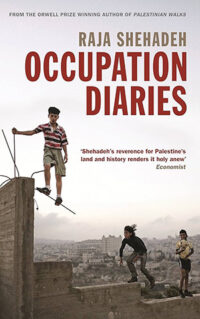Book review: Occupation Diaries by Raja Shehadeh

Palestinian author, lawyer and human rights activist Raja Shehadeh has won prizes for his writing and his humanitarian work. Occupation Diaries is one of several non-fiction books he has written about Palestine through the lens of his own life. Born in Ramallah, he attended law school in the UK, then moved back to Ramallah to join his father’s law practice. To the best of my knowledge he still lives in Ramallah now and certainly that’s where he was living in 2012 when he published this book.
As the title suggests, Occupation Diaries is a series of diary entries covering the period December 2009 to December 2011. Shehadeh writes about his daily life but adds in historical and political detail.
In the opening entry, Shehadeh travels with a group of friends to a countryside spot called Wadi Qelt. As they spread out their picnic on a rock next to a picturesque pool, a large family arrives and settles on a rock on the opposite side of the water. Shehadeh’s group are Christians and/or foreigners dressed in Western clothes; the family group is local and Muslim, with the women in hijabs and long black skirts. Mutual suspicion quickly grows and there is a brief shouting match, though it is quickly defused.
Shehadeh then fills in a little background to the tensions, not least of which he attributes to the constant presence of Israeli soldiers, particularly at the checkpoints that block roads at frequent intervals. These mean that a 10 or 15 mile journey (such as from Ramallah to Jerusalem) can easily take hours. Not helped by the fact that there are separate roads for Israeli and Palestinian traffic around and between cities – with the Palestinian route of course being longer and in worse condition.
“I am just back from a day spent in Jerusalem. It is not the city I used to know and enjoy. When Father was alive he was optimistic, believing that there was a possibility of compromise and a shared Jerusalem. I don’t know where he found his optimism.”
One of the most shocking moments in the book for me is when Shehadeh flies back from a book tour of the US on a Continental flight that aside from him is full of Americans and Israelis. Before landing, a short film is played on the flight that is pure Israeli propaganda, including a map that shows Bethlehem and other West Bank cities as part of “Greater Israel”. Of course, this also illustrates that Shehadeh’s life is atypical for a Palestinian. While he doesn’t have completely unrestricted freedom of movement, he does have the money, career and fame to enable him to travel both to Israel and beyond pretty often.
But Shehadeh is of course aware of this. Through his work in law and human rights he is exposed to the full gamut of struggles that Palestinians face. His writing is both matter-of-fact and eloquent, clearly explaining details without lingering too long on any.
“Attributing what is purely the criminal action of a few to an entire religion, while calling a legitimate struggle criminal, serves only to confuse the issues, corrupts language and minds, fuels intolerance and discrimination, and can easily lead to more of those same horrors that such blind reactions mean to condemn. Israel is also guilty of contributing substantially to the corruption of political language. Since the 1970s it has been calling all those who resist occupation ‘terrorists’.”
What I found sad about this book is how hopeful Shehadeh is that change is coming for the better. This time period includes the Arab Spring and while it is beautiful and moving to read about how meaningful this news was for many Palestinians, it’s also hard to avoid the fact that the wave of revolution never reached Palestine. Similarly, when Shehadeh bemoans how bad the situation is between Israel and Palestine, with the wall half built and settlements on the rise, he often adds that it’s got so bad that this must be the low point, the moment at which the rest of the world wakes up and stops blindly supporting Israel.
Discussion of the political situation is alleviated by Shehadeh’s musings on his small – but clearly well cared for – garden. He soliloquises on scents, flowers, the pleasure of picking grapes or olives with his wife. He clearly loves his country and I can see why his most famous book is Palestinian Walks, his 2008 book about six walks through Palestine. Which is now on my wishlist along with Shehadeh’s 2020 book Going Home, a reflection on how Ramallah has changed over its 50 years of occupation.
Published 2012 by Profile Books.
Source: Christmas present from my Dad.
Adding all these books to my TBR, if they’re not already on it.